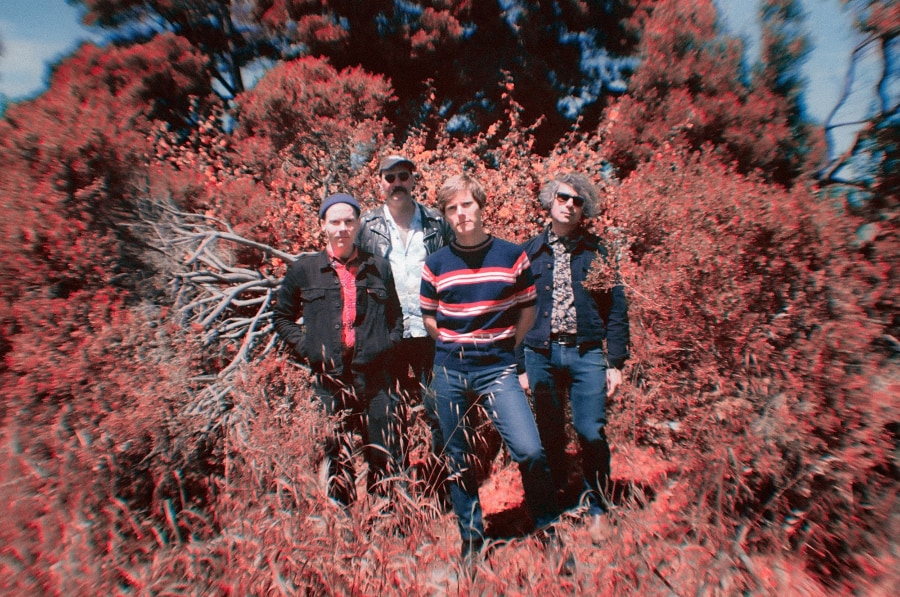Chime School's Andy Pastalaniec does it all for the love. As the drummer for dreamy pop bands like Flowertown, Seablite, and very occasionally The Reds, Pinks & Purples, the San Franciscan musician brings a beaming energy to everything he lays his hands on. However, while Pastalaniec's work as a drummer has a graceful touch, it's his jangle-pop solo project that takes the cake.
Beginning "almost as a dare" from his partner—who gifted Pastalaniec a cassette 4-track Portastudio to encourage him to step out from behind the kit—Chime School channels the "formative jangle" of his favorite 1980s and '90s indie-pop bands. Allmusic described Chime School's 2021 self-titled debut as "a lovely combination of being wrapped up tight in a nostalgic hug, and being slapped awake by immense hooks that have the same effect as about seven cups of coffee."
As Chime School's sole songwriter, performer, and producer, Pastalaniec is well aware of the manic sound of his debut. "I was trying to jampack decades of pop fandom into one album, stuffing in as many little things as I could," he laughs. "That was the first record where I wrote, played, and recorded everything myself, so there was a huge learning curve to it."
Chime School's sophomore effort, The Boy Who Ran The Paisley Hotel, is an assured continuation, meticulously weaving lyrical (and musical) references into a symphony to pop songcraft itself. Like the Feelies' change of pace from Crazy Rhythms to The Good Earth, Pastalaniec recentered himself by slowing down. "I took a step back and chose a more condensed palette," he explains. "That brought me a bit closer to the sonic vision I had from the beginning."
On top of Chime School's primary inspirations, such as Razorcuts and Sonic Flower Groove era Primal Scream, The Paisley Hotel layers 12-string acoustic guitars à la The Go-Betweens' "Head Full of Steam" over synthetic drum beats in the style of The Field Mice. If that sounds like getting down into the weeds, that's the whole point. Specificity of sounds and meticulous attention to detail are the names of the game for Pastalaniec, who loves vintage film cameras as much as he does obscure seven-inches from Sarah Records.
Despite the cheekiness of naming your album's first song "The End," this melancholy, slow-paced jangler is a perfect entrypoint to The Paisley Hotel. Originally titled "Start Again (Again)," as a tribute to the opener from Teenage Fanclub's 1997 album Songs from Northern Britain, Pastalaniec stresses the lyrics are not autobiographical. "Just like anyone making a mixtape, I wanted the album to start off with a certain hum," he says, "and raise things up from there."
"Wandering Song" is about the energy we expend distracting ourselves from crises unfolding around the world; how we tend to turn inwards when our only chance to survive them is through collective organizing. After finishing the album, Pastalaniec read Naomi Klein's latest book, Doppelganger. Once again, he found his thoughts echoed in a formative influence—this time on his politics.
"In Naomi Klein's chapter about social media and our digital golems, she articulates some of what I was trying to get at far better than I could," says Pastalaniec. When he repeats the mantra-like lyrics "nothing's wrong / when you're moving too slow," this sounds like a teachable moment for all of us. Yet Pastalaniec is patient and compassionate, welcoming everyone to change with chiming pop.
"Give Your Heart Away" is the album's pumping musical ticker, contracting and dilating with squelchy keys, wordless ba-da-das, and guitar solos that curlicue like a pig's tail. Lyrically, its themes of looking back to memories of the past toy with the terminology of his second passion.
"Photography is another medium that informs what I do musically," Pastalaniec says. "The song is ‘framed' by an out-of-time intro and outro; there's a lyric about a camera lens opening to another time and place; it's meant to capture a distant moment in time. Perhaps that moment was in one's younger years, when you perhaps spent a bit too much directionless time out and about in the bars at night…"
"The lyrics are not necessarily autobiographical—I've never had bleached hair—but I think it's something that a lot of us can relate to," he laughs.
- Jesse Locke

